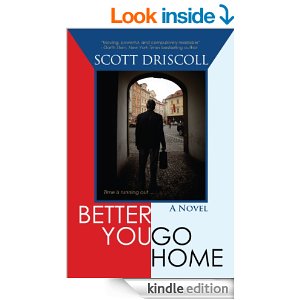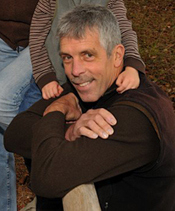As part of my lead up to #NaNoWriMo2016 and November’s month of literary madness, I am continuing my series of guest interviews. Today, we are speaking with the always intriguing Scott Driscoll.
Scott is an award-winning writing instructor at UW Continuing and Professional Education, is a well-known journalist and editor, and is the author of Better You Go Home, a literary novel which takes the reader to Prague shortly after the Velvet Revolution. (My review can be read here.)
I have attended several seminars offered by Scott through PNWA, and have always come away feeling inspired.
CJJ: What books influenced you most as young reader?
SD: Like most children, I liked any story that fueled my imagination, such as Aesop’s Fables, Grimm Fairy Tales, and the like. Somewhere in middle school I discovered a preference for realism and actually read, and was fascinated by, Moby Dick. I distinctly remember going to class and sniffing the palms of my hands, convinced I’d somehow got ambergris, which never really washes off, on my hands. Steinbeck’s Of Mice and Men also impressed me greatly at that age. I found American social realism (aka naturalism), such as anything by Drieser, dreary beyond belief.
CJJ: How did these books influence your early writing?
SD: The dreary books I was forced to read in adolescence and as a young teen led me to conclude that you had to be pedantic and stuffy to be a writer and that turned me off to writing fiction altogether. The exceptions would be Huck Finn and Tom Sawyer and E. A. Poe stories. Those were exciting. What I didn’t realize until later is that I was looking for a voice that spoke to me. I really didn’t hear that voice until I encountered French existential novelists like Camus and Jean Genet (especially in The Thief’s Journal, a fictionalized memoir). Compared with potted stories like de Maupassant’s, these took me into what felt like a word wilderness, where you could easily get off trail and run into danger and I loved that feeling. I also discovered and loved Dostoevsky and Kafka. There was a darkness and urgency and psychological depth in that writing that I could not find in American authors, until, in college, I discovered the novels of Norman Mailer and Edward Abbey and now I had a voice that was raw and stories that were more about the psychological life of the characters and less about managing a plot. Not that I had anything against plot. It was the raw power of the words I needed to fall in love with first.
CJJ: You have said elsewhere that “Writing for me is about applying form to the mysteries we suffer.” Can you expand a little on this idea?
SD: I borrowed that phrase from Wright Morris. On my blog site I wrote about the first time, as an adult, I tried to write fiction. I was 21 years old, taking a break from college, living in Darwin, Australia and working warehouse and restaurant jobs to save money so I could travel on. With time on my hands, and a depressing lack of anything better to do, I essentially locked myself in my boarding house room, sat under the paddle fan, and spent several hours writing nothing. What I lacked, I realized, was not the ability to write, but knowledge of form. Without an understanding of story structure, I would churn out a stream of words that was nothing more than a verbal outpouring of my inner angst, the kind of sophomoric, I realized that day, drivel that excites only high school English teachers, who are grateful for any grammatical verbal pyrotechnics. Without an understanding of form, I could not begin to solve the mysteries I knew were locked up inside me.
CJJ: You have also said “Any story that involves a quest – and that is most stories – starts with a disturbing event known to writers and film-makers as the “inciting incident.” What is the most important thing for an author to consider when creating this event?
SD: It took me a long time to accept that any story with any kind of plot must start with a disturbance. But once you accept that, what does it really mean? A disturbance, as in, someone gets mugged, a bank gets robbed, aliens land, a shark throws a vacation resort town into chaos? If it’s just event for event’s sake, anything is possible and nothing is particularly meaningful. Rather, an inciting incident must disturb a balance that pertains in the hero’s world, and must do so by working against a deeply held value, so that the hero, we can be sure, will not shrug it off as simply bad news but rather will be forced to react in a way that will further endanger the balance in that familiar world.
 CJJ: When did you first have the idea to write “Better You Go Home,” and how long did it take to complete it?
CJJ: When did you first have the idea to write “Better You Go Home,” and how long did it take to complete it?
SD: In 1994, three and a half years after the Velvet Revolution, I went to the Czech Republic to track down family that my Czech relatives in Iowa had stopped communicating with. I found the village, the farmhouse, met some people, but had been too cheap to hire a translator and didn’t get beyond discovering that there was some unspeakable mystery, some “inciting incident,” that had created a rift in the family. In 1999, armed with better information sent to me by a cousin who’d followed my lead to that village, and armed this time with a translator, my father and I went back to this village and heard stories, and reviewed records, and I learned enough that I felt I could write a novel with this family mystery at its heart. At the time I had quit writing fiction (needing to make money) and started instead writing for magazines, and between that and teaching and being divorced and raising a child, I really didn’t have time to write a novel (but stayed up late virtually every night reading everything I could get my hands on related to the topic). A couple years later, needing to get back to fiction, I started in pretending I was writing chapters, but really just produced fluff based on my research. From the time I began writing chapters that could stick, and publication, ten years went by. I had told my wife—we married just before the time I got serious with this novel—I’d have it done in two years. Our son likes to remind me that he was ten when it was published. I remind him that I was busy. But, really, honestly, it took so long because my early understanding of the story lacked the form that would allow me to finally tell the story. Much of my groping in the early years could have been circumvented had I discovered that form early in the process.
CJJ: Once a new work is in progress, what are the main hurdles you have to overcome in laying down the first draft?
SD: That depends. If it’s a short story, I will usually allow myself to have a crude idea based on a situation that sets forth from a known inciting incident with a disturbed character but without a known outcome, just set forth and go, knowing the real story will emerge in the re-writes anyway. With a novel, it’s worth doing more planning. Once you have your premise, the first hurdle you have to overcome is finding a basic story structure that will naturally lead to a surprising but inevitable outcome. Then you work on your characters, that is, you start with characters in mind, but now you have to imagine how the events required by the story structure you have imagined will be causally connected to the characters’ needs and wants and fears and expressed and hidden desires. Without causal connections you just have meaningless events. Once causal connections are asserted, you encounter another hurdle. The characters begin to morph according the logical requirements of the causal connections you have asserted. Without a strong sense of the story structure, things can quickly morph into an ugly, hydra-headed monster, ie, chapters screaming to be thrown away.
CJJ: What are you working on now?
SD: Two things. First, a collection of connected stories that show a young couple starting off careers and family and that show how that trajectory unfolds over the years. For my raw material, I am using stories published years ago, but that I felt never broke through to their bigger potential. Will I achieve that now? Let’s just say, I know a whole lot more about writing now than I did then. I only hope that I can recapture the immediacy that can easily get lost behind a command of technique. My second project, still in the planning stages, is a sci-fi time travel novel. This will be my first attempt at a popular fiction genre. I was put up to it by an editor friend. My wife was intrigued by the idea of me writing a novel that had the potential to make some money. Having handed over an 18,000 word treatise, that covers my idea for the story nearly chapter by chapter, I am now excited to get to work.
CJJ: What books can you recommend for new writers who are just beginning to learn the craft?
SD: The best book on craft, generally, is Writing Fiction by Janet Burroway, now in its ninth edition. That said, Story by Robert McKee, though written for screenplay writers, contains the best craft talks, with illustrations from films, on plot and character and scene that I have ever come across. I would definitely start with those two, then add Scene & Structure by Jack Bickham, as an enhancement to what McKee has to say. Then, they should all get their hands on What If, the third edition, edited by Anne Bernays and Pamela Painter. (Do not let Amazon trick you into buying the inadequate first edition.) This book is full of mini-lessons and exercises for writers who know about craft but need practice.
CJJ: Where can people find your classes and seminars this fall?
SD: In fall 2016, starting the first week of October, I am teaching one section of Literary Fiction I, the introductory course, and one section of Advanced Fiction Writing, a course intended for writers of both literary and popular fiction who’ve had experience with taking writing classes or who have extensive writing experience. Both classes are offered through the University of Washington in the Professional and Continuing Education department. If interested, folks should go to www.keeplearning.uw.edu and look for these courses, or, if they have questions, seek more details at www.pce.uw.edu. They can also email me at sdriscol@uw.edu. I also teach a summer workshop class and that is posted on my blog site. http://www.scottdriscollblogs.wordpress.com.
- In the meantime, I am a guest editor reviewing manuscripts at the fall 2016 Write On The Sound conference and will be at the Edmonds, WA site on Saturday Oct 1 and Sunday Oct 2. On Nov. 10, I will be a guest workshop leader at the November meeting of the Skagit Valley Writer’s League, held in Mt. Vernon, WA. Those interested can peruse their web site for more information. In May, 2017, I will be a workshop leader, lecturer etc. at the Write On The River conference held in Wenatchee, WA
Scott, thank you so much, for being a part of this little series on the craft of writing. As always, you are a joy to talk to!
- Blogging at Scott’s Blog
- On Amazon
- On Goodreads
- Follow Scott on Twitter: @ScottDriscollUW









Thanks for your excellent questions.
LikeLiked by 1 person
It was my pleasure!
LikeLike